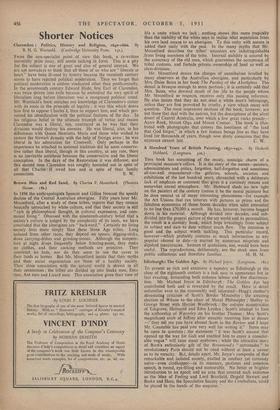Shorter Notices
FROM the non-specialist point of view this book, a re-written University prize essay, still seems lacking in form. This is a pity for the subject is one of great and also of general interest. We are apt nowadays to think that all those of us who are "liberals at heart" have been ill-used by history because the twentieth century seems to have rejected political moderation. Thus we forget that political moderation is seldom vindicated other than posthumously. In the seventeenth century Edward Hyde, first Earl of Clarendon,
• was twice driven into exile because he embodied the very spirit of liberalism long before liberalism was a recognised political creed. Mr. Wormald's book enriches our knowledge of Clarendon's career with its roots in the principle of legality ; it was this which drove him first to oppose Charles I, then to support him, and which pre- vented his identification with the political factions of the day. In his religious belief in the ultimate triumph of virtue and reason Clarendon was a liberal, too, convinced as he was that their divisions would destroy his enemies. He was liberal, also, in his differences with Queen Henrietta Maria and those who wished to restore the Stewart dynasty with the help of foreign arms ; he was liberal in his admiration for Cromwell. Only perhaps in the importance he attached to national tradition did he seem conserva- tive rather than liberal, though in this country, at any rate, there is no inevitable antithesis between the conservative and the liberal conception. In the days of the Restoration it was different, and this second time Clarendon was roughly hounded out in spite of all that Charles II owed him and in spite of their family





















































 Previous page
Previous page